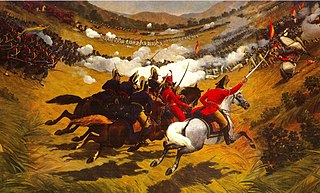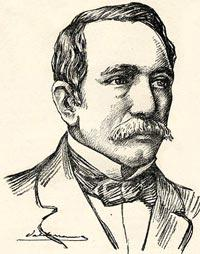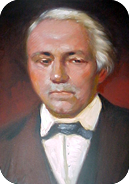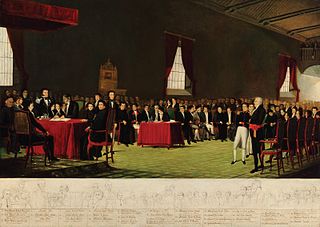
José Antonio Páez Herrera was a Venezuelan politician and military officer who served as the president of Venezuela three times. The first as the 5th president from 1830 to 1835, the second as the 8th president from 1839 to 1843, and the third as the 15th president from 1861 to 1863. He fought against the Spanish Crown for Simón Bolívar during the Venezuelan War of Independence. Páez later led Venezuela's independence from Gran Colombia.

A llanero is a South American herder. The name is taken from the Llanos grasslands occupying eastern Colombia and western-central Venezuela.

The Venezuelan War of Independence was one of the Spanish American wars of independence of the early nineteenth century, when independence movements in South America fought a civil war for secession and against unity of the Spanish Empire, emboldened by Spain's troubles in the Napoleonic Wars.

Lt. General José Antonio de la Caridad Maceo y Grajales was a Cuban general and second-in-command of the Cuban Army of Independence.

Narciso López de Urriola was a Venezuelan-born adventurer and Spanish Army general who is best known for his expeditions aimed at liberating Cuba from Spanish rule in the 1850s. His troops carried a flag that López had designed, which later became the flag of Cuba. Following his final failed attempt he was captured and garroted in Havana.

The Battle of Carabobo, on 24 June 1821, was fought between independence fighters, led by Venezuelan General Simón Bolívar, and the Royalist forces, led by Spanish Field Marshal Miguel de la Torre. Bolívar's decisive victory at Carabobo led to the independence of Venezuela and establishment of the Republic of Gran Colombia.

General Juan Antonio Sotillo (1790–1878) was a nineteenth-century military leader from Venezuela. During his long life, uncommon for a military leader at the time, he served under the army of Venezuelan general Simón Bolívar, as well as in most of Venezuela's 19th century civil wars and military revolts.

José Antonio Anzoátegui (1789–1819) was a Venezuelan military officer who fought in the Venezuelan and Colombian Wars of Independence.

The National Pantheon of Venezuela is a final resting place for national heroes. The Pantheon was created in the 1870s on the site of the ruined Santísima Trinidad church from 1744 on the northern edge of the old town of Caracas, Venezuela.

Santiago Mariño Carige Fitzgerald, was a nineteenth-century Venezuelan revolutionary leader and hero in the Venezuelan War of Independence (1811–1823). He became an important leader of eastern Venezuela and for a short while in 1835 seized power over the new state of Venezuela.

José María Córdova Muñoz, also known as the "Hero of Ayacucho", was a General of the Colombian army during the Independence War of Colombia, Perú, and Bolivia from Spain.

José Cristóbal Hurtado de Mendoza y Montilla, commonly known as Cristóbal Mendoza, was a Venezuelan lawyer, politician, writer, and academic. Cristobal is best known for serving as the first official President of Venezuela from 1811 to 1812. After earning a master's degree in philosophy in Caracas and his doctor utriusque juris in the Dominican Republic, early in his professional career he served in various law firms in Trujillo, Mérida, and Caracas. He moved to Barinas in 1796 to practice law, and in 1807 was elected Mayor of Barinas. In 1810, Mendoza joined the insurgent movement started by wealthy Caracan citizens against the Spanish crown, and in 1811 was elected to represent the province of Barinas in the newly founded Constituent Congress of Venezuela. Days later he was appointed the first president of the First Republic of Venezuela, a role he shared as part of a triumvirate. Until his term ended in March 1812, Mendoza began the war for independence against the parts of Venezuela that still supported the Spanish monarchy, authored the Venezuelan Declaration of Independence, and also took part in constructing the first Constitution of the Republic of Venezuela.

The Federal War — also known as the Great War or the Five Year War — was a civil war in Venezuela between the Conservative Party and the Liberal Party over the monopoly the Conservatives held over government positions and land ownership, and their intransigence in granting any reforms. This drove the Liberals – known as the Federalists – to look for greater autonomy for the provinces: a new federalism for Venezuela, as it were. It was the biggest and bloodiest civil war that Venezuela had since its independence from Spain on 5 July 1811. Around a hundred thousand people died in the violence of the war, or from hunger or disease, in a country with a population of just over a million people.

The Battle of Las Queseras del Medio was an important battle of the Venezuelan War of Independence. It took place on April 2, 1819. The forces of José Antonio Páez consisted of 153 mounted llanero lancers. They were pitted against more than 1,000 Spanish cavalry. The battle is noted for a phrase of Páez's that became famous: ¡Vuelvan caras! –although some sources state that he actually said ¡Vuelvan, carajo!.

Afro-Venezuelans are Venezuelans of African descent. Afro-Venezuelans are mostly descendants of enslaved Africans brought to the Western Hemisphere during the Atlantic slave trade. This term also sometimes refers to the combining of African and other cultural elements found in Venezuelan society such as the arts, traditions, music, religion, race, and language.

The State of Venezuela was the official name of Venezuela adopted by the constitution of 1830, during the government of José Antonio Páez. The name was maintained until 1856 when in the constitution promulgated in that year it changes the official name of the country to Republic of Venezuela. In the Constitution of 1864, the United States of Venezuela was established.
The Revolution of the Reforms was a military movement in Venezuela between June 7, 1835, and March 1, 1836, against the government of José María Vargas, the conservative Congress, and the influence of José Antonio Páez. It was led by outstanding independence heroes such as Santiago Mariño, Diego Ibarra, Pedro Briceño Méndez, José Laurencio Silva, José María Melo, Blas Bruzual, Luis Perú de Lacroix, Pedro Carujo, José Tadeo Monagas, Renato Beluche, Andrés Level de Goda, and Estanislao Rendon.

The Venezuelan independence was the juridical-political process that put an end to the ties between the Captaincy General of Venezuela and the Spanish Empire. It also implied the replacement of the absolute monarchy by the republic as the form of government in Venezuela.

León de Febres Cordero y Oberto was a Venezuelan Conservative general and politician who participated in the Spanish American wars of independence (1812-1824), the Gran Colombia–Peru War (1829), the Revolution of the Reforms (1835-1836) and the Federal War (1859-1863).




















